Hiroshima at 75: A Japanese American Perspective - Pacific Citizen ( 08/14/2020 )

The Eternal Flame Dome (Photo: Courtesy of Rob Buscher)
A descendant of the town devastated by the A-bomb, the writer gives hope for a world without nuclear weapons.
By Rob Buscher, Contributor
Since the end of World War II, the United States has served as de facto leader of a world order characterized by international cooperation and global commerce. However, at a time when disease runs rampant throughout most of the country without any clear plan for curtailing the current COVID-19 pandemic, the U.S. has seemingly vacated its status as world leader.
America has faced similar crises in the past, yet this moment seems different. Perhaps in part because the failure of leadership related to the pandemic is simultaneously occurring amid a society-wide reckoning related to racial equity that the murder of George Floyd has brought about.
These circumstances have thrust us into an unparalleled crisis as many Americans find themselves questioning their faith in our institutions of democracy and revisiting controversial aspects of our nation's past with a critical eye.
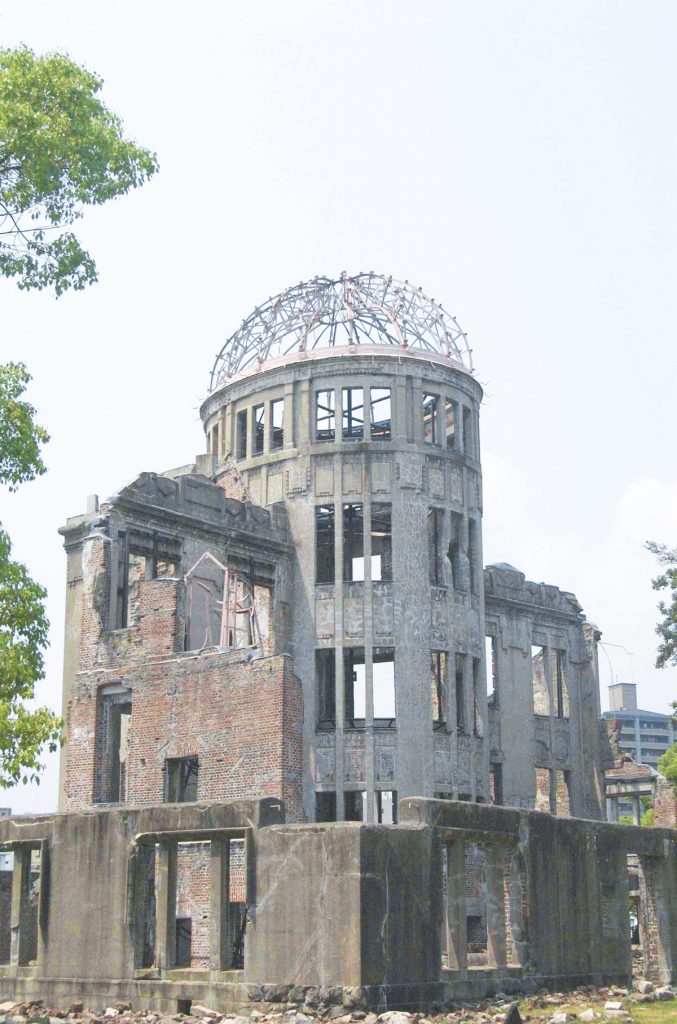
The A-bomb Dome in Hiroshima (Photo: Courtesy of Rob Buscher)
It is in this unique moment that we commemorate the 75th anniversary of the atomic bombings of Hiroshima and Nagasaki on Aug. 6 and 9, 1945, respectively. War is terrible, and people on all sides of any conflict commit atrocities. However, it is possible, and even necessary, for us to interrogate the extraordinary cruelty and blatant disregard for human life that the atomic bombings represent if we are to guarantee that they are never again used in war.
Nuclear weapons are far too dangerous for any country to possess, and they have the potential to leave ruinous environmental impacts for generations to come. To put this in perspective, approximately 240,000 people died from the atomic bombings on Hiroshima and Nagasaki and radiation-related illness — twice the total population of Japanese Americans who were incarcerated during WWII. Elders, men, women and children — noncombatants who were going about their daily business in their civilian lives all perished.
Ron Kuramoto of the Pacific Citizen Editorial Board recently wrote an op-ed titled "No More Gaman!" that espoused the need for Japanese Americans to speak up about current-day injustices. I believe it is also necessary for us to apply this sentiment to historical injustices and no longer accept the government narrative that the atomic bombings were a necessary evil.
History tends to be remembered not only from the perspective of the victor, but also in absolutes. In U.S. public education, we have been taught only one perspective on the closing chapter of WWII. To fully understand the enormity of this event, it is necessary to delve into the atomic bombings with greater nuance.
The conventional narrative according to U.S. history books is that the atomic bombings were needed to bring a decisive end to the war and avoid the loss of further lives in a ground invasion of Japan. While the appallingly high civilian casualties during the Battle of Okinawa is often cited as a motivation for the atomic bombs, the reality is far more political in nature.
By the week of Aug. 6, 1945, the Soviet Union was days away from invading the Northern Japanese Island of Hokkaido. Wishing to avoid a divided occupation similar to East and West Germany, the U.S. needed to expedite the end of the war, positioning itself as the sole victor.
Demonstrating the horrific destructive power that the U.S. now possessed in its atomic arsenal, the bomb also set a tone of American dominance in postwar U.S.-Soviet relations. A more cynical view point of the bombing would suggest that in addition to the political gains, the scientific community also wanted to study the impact of the bombs on live subjects.
Despite even the worst genocidal crimes of the Nazi regime, it is difficult to imagine the American public accepting a weapon of this magnitude being used in the European front of the war. Undeniably, race is an important factor in this distinction, and the impact of highly racialized anti-Japanese propaganda is clearly evident.
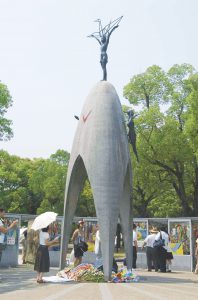
The Children's Peace Monument commemorates Sadako Sasaki and all child victims of the Hiroshima bombing. (Photo: Courtesy of Rob Buscher)
Growing numbers of legal experts are now arguing that the atomic bombings would be considered war crimes by today's standards. Article 147 of the 1949 Geneva Convention defines a war crime perpetrated against a noncombatant civilian as "wilful killing, torture or inhuman treatment, including biological experiments, wilfully causing great suffering or serious injury to body or health … and extensive destruction and appropriation of property, not justified by military necessity and carried out unlawfully and wantonly."
The atomic bombings appear to fit that definition, as it is indisputable that the U.S. military knowingly killed civilians without reasonable effort to notify them of imminent danger. This is an important distinction, as even the deadly Tokyo firebombing campaign (which killed more people in a single night than either the bombing of Hiroshima or Nagasaki) was preceded by an airborne leaflet drop warning civilians to vacate the city.
Imperial Japan also inflicted countless atrocities throughout its conquest of Asia but was ultimately subject to war crimes trials in the postwar era. Revisiting the atomic bombings as a potential war crime shatters the unassailable image of the U.S. military as "the good guy" during WWII — like much of the Japanese American narrative in general.
Openly discussing these subjects still carries a deep taboo — one that often results in emotionally charged knee-jerk responses that revert to propaganda narratives justifying the bombing as a military necessity.
An additional burden that might keep the Japanese American community from taking a more critical stance on this issue is the political reality that much of our community's privileges and upward social mobility in the postwar era is thanks to the valor and unimaginable sacrifices of our Nisei veterans.
I would argue however, that it is possible to criticize the military's role in this atrocity while also celebrating the good deeds of our soldiers.
In Japan, the taboo surrounding open discussion of the atomic bombings runs even deeper, largely related to the stigmatization that hibakusha (atomic bomb survivors) and their descendants have faced in Japanese society.
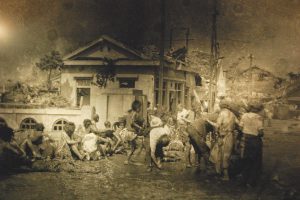
Hibakusha in Hiroshima following the bombing (Photo: Courtesy of Rob Buscher)
Early in the postwar era, some hibakusha were denied housing or jobs over erroneous concerns related to the transmission of radiation-related diseases. Hibakusha and their descendants were also generally viewed as unsuitable marriage prospects by families outside the region for fear of birth defects. Even today, it is not uncommon for individuals to change their name or obscure their family origins if they move outside the region.
The trauma of being the only country in the world to have witnessed the horror of atomic warfare is said to persist as a nuclear stigma in the Japanese psyche. In commemorating this grim anniversary, I wonder to what extent this also translates into the Japanese American community as I consider the impact on my own family.
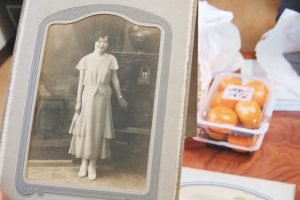
Rob Buscher's hibaachan, Asako Marumoto, in a 1927 photo (Photo: Courtesy of Rob Buscher)
My great-grandmother, Asako Marumoto, or hibaachan as I called her, lived in Hiroshima from ages 5-18. Born to Issei plantation workers in Hilo, Hawaii, hibaachan was sent to live with her maternal grandparents in Hiroshima so that she could experience a traditional Japanese upbringing.
There, she was raised in a multigenerational household by her mother's brother and his wife. She named their first two children — one died in the bombing while working as a teller in a downtown bank; the other survived with minor injuries, protected from the blast radius by Higashiyama, a small hill that stood between the city and the suburban neighborhood where our family home is located.
Another cousin perished while she was clearing out debris and trash from the city center with her classmates so there would be less fuel to burn in the eventuality of firebombing that had wracked other Japanese cities since March 1945. When the family went looking for her, all they found was her metal bento box.
I have often wondered what those initial moments must have been like when my great-grandparents learned of the destruction of their hometown. I asked my o baachan , Yukari Mikesell, whether she remembered that moment.
She responded, "We all seem to have not been close by our parents at that time. I know Mother was worried, but there was nothing they could do about it … shikata ga nai. I do remember when we learned the war was over. Sirens were going off all around as we left the orchard. Mom and Dad were sad and shook their heads and said that Japan did not know the might and supplies that the Americans had. What a foolish thing it was to go to war with America."
She also remembers her mother moving listlessly through her days in a near-catatonic state for weeks as she tried to cope with the assumption that everyone she knew and loved in Hiroshima was dead.
News about her family finally reached hibaachan about a month later in September 1945. Mourning the deaths of her cousins, hibaachan saved what little money she could from our family's sharecropping work and her side job as a domestic worker to send food, textiles and other materials to her surviving relatives in Japan.
"We sacrificed a lot to make sure that we sent things to help our relatives out," Mikesell recalled. "We did without. We went to the store and bought large-size food products like sacks of rice and even boxes of Hershey's bars to send. Mother used to talk about the fact that her own children wore tight clothes and shoes because of the cost of sending things overseas."
In the 18 years I knew her, hibaachan was enigmatic to me for a number of reasons as an elderly woman with limited English proficiency who had lived a lifetime of hardship before I was born.
Sent an ocean away from her family as a young child, after graduating high school, she married a man who was virtually a stranger and moved to California, where they toiled in a substandard plot of leased land until Pearl Harbor happened, then fled to Utah during the so-called voluntary evacuation so their children would not grow up behind barbed-wire fences.
Her life story was characterized by starting over again and again in the face of adversity, coming from a relatively privileged existence in Hiroshima and witnessing unimaginable tragedy play out for our family on both sides of the Pacific. Yet, she was a proud American. Hibaachan was among the first Issei in Utah to get her naturalization papers in 1954.
Her longevity and sustained connection to her overseas relatives allowed my sister and I to have a direct connection to our Japanese lineage — a rarity for Hapa Yonsei kids who grew up in the 1990s. The strength of our relationship was possible only because of my mother Sandra Buscher's special relationship with her grandmother.
Reflecting on her perceptions of Hiroshima and memories of her grandmother, Sandra Buscher wrote, "It has always been a mismatch for me — the world's view of Hiroshima as a place of horror because of the bombing, and Grandma's joy as she talked about her childhood there. I grew up with Grandma telling me stories about life in her grandfather's house, about the food they ate, about the gardens and scenery, festivals, kimonos. She would say, 'I want to go there with you. I want to show you Japan.'
"[Grandma] grew up as the oldest girl in a large circle of cousins, many of them girls," Sandra Buscher continued. "So, she had little girls to look after all through her growing up years. When I was born as her oldest granddaughter and she suddenly had a little girl in her life, she felt that joy again and a connection back to a more innocent time. And she wanted to share it with me. I feel honored that I could be part of that path back to the happy memories of her youth."
Sandra Buscher traveled together with her grandmother and mother in 1984 to visit Japan — where she met our Hiroshima relatives for the first time. Mikesell recalled an important detail from their visit to the Hiroshima Peace Park as they were passing the Genbaku Dome.
"As we passed by and looked at it, Mother said she used to go there when she was a little girl. She used to buy sweets and craft things in this building," Mikesell said.
This small anecdote has given our family a strangely comforting association to an image that otherwise symbolizes the total destruction from one of humanity's ugliest moments.
In 2008, I, too, had the opportunity to visit Hiroshima for my first time during the 63rd anniversary of the atomic bombing. I was surprised that aside from the Genbaku Dome, there were no visible remains of the devastation that once lay there.
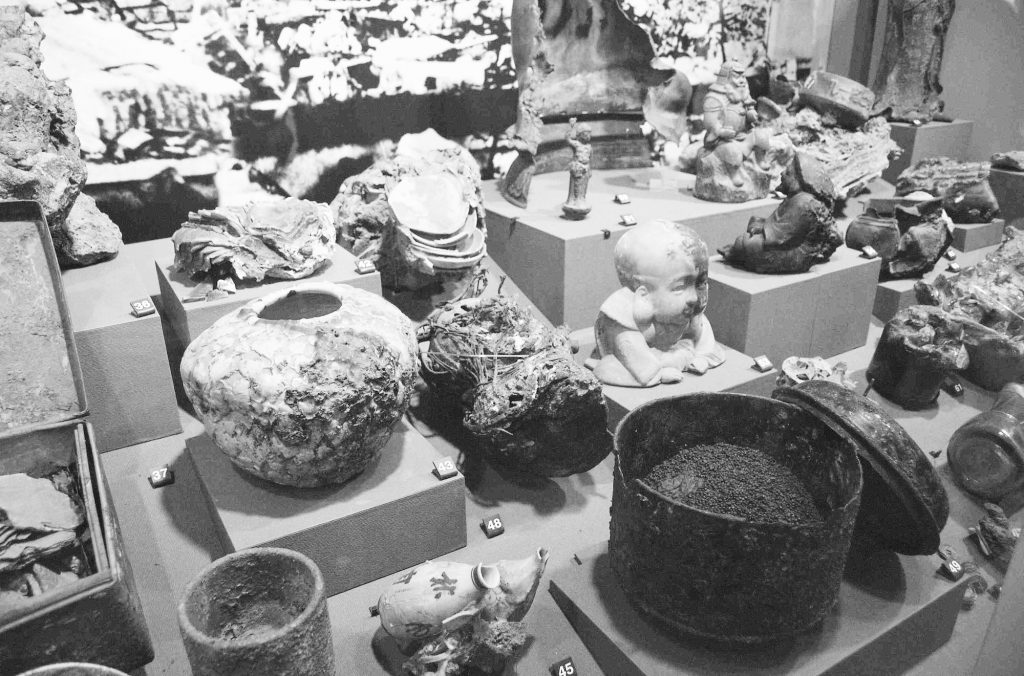
Hiroshima bomb artifacts at the Hiroshima Peace Memorial Museum (Photo: Courtesy of Rob Buscher)
Visiting the Hiroshima Peace Memorial Museum was naturally an overwhelming experience. Yet, beyond the immense sadness and anger I felt in those moments that such an atrocity had been perpetrated by the country of my birth on my family's ancestral home, my lasting impression of that day was the feeling of hopefulness that the memorial service evoked.
Afterwards, attendees had the opportunity to write a message of peace on paper lanterns that were launched on the river later that evening. I will forever remember the soft glow of the thousands of floating lanterns as they drifted down the Motoyasu River.
As an American, I will likely never understand the complex emotions that hibaachan felt when facing the memories of her past. Nor can I fully appreciate the strength and resilience of our Hiroshima relatives who lived through this horrific experience. But I am immensely proud to be a descendant of Hiroshima, and hope that one day we may live in a world without nuclear weapons.

 Article is LOCKED by moderator [Split Personality]
Article is LOCKED by moderator [Split Personality]

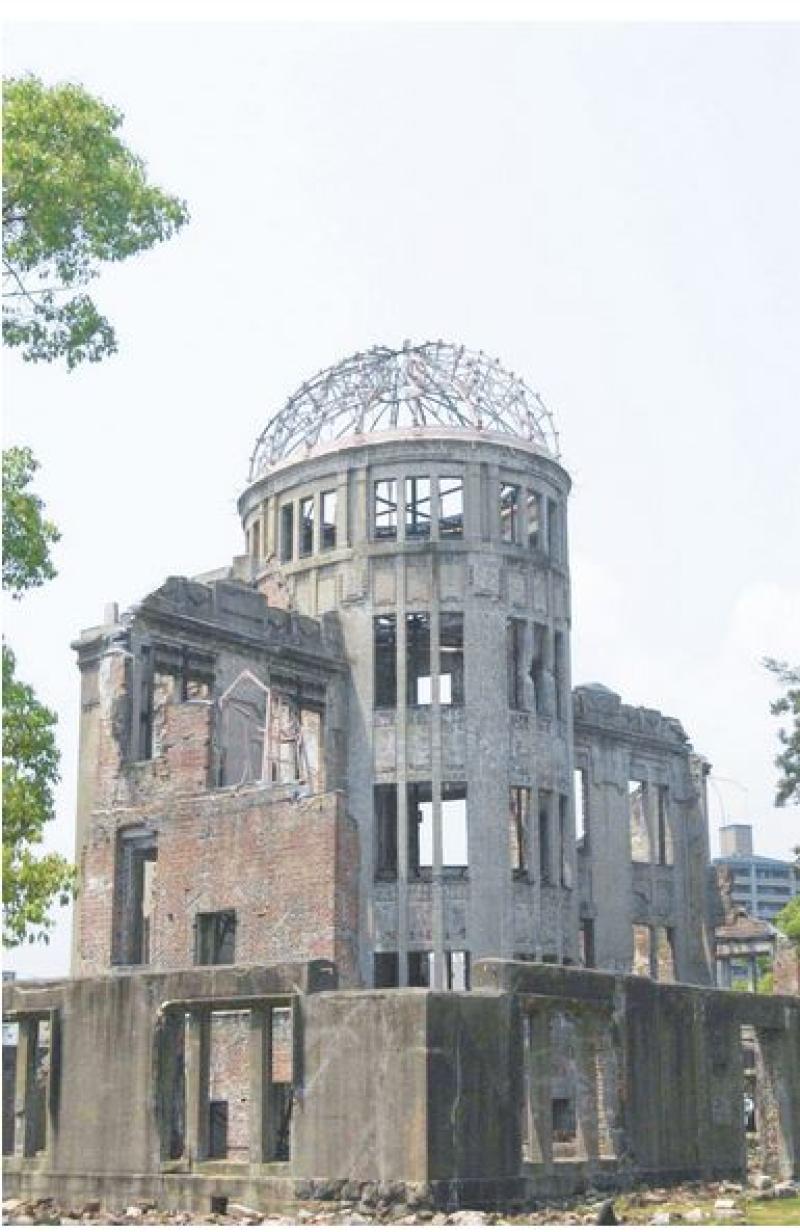
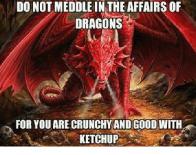

Many, many years ago at University, we had to take a prescribed amount of religion, all sorts of religions,
not just the religions we were familiar with or agreed with. The Jesuits and CBs were there to teach you that there were alternatives
not convert or re baptize us.
What values and lessons you took out of the classes were yours, not theirs.
Although the decision makers in America knew that the atomic bomb was a terrible weapon that would kill tens of thousands of people, it was believed at that time that weapons were meant to be used. I don't think that there was ever any serious consideration given to not using the bomb.
At least 50 million people (some say 60 million) died in WW2. As horrible as the deaths at Hiroshima and Nagasaki were, there were a very small part of the total civilian deaths. It is not realistic to think that Truman and the others with input into the use of the bomb should have decided not to use it.
"Despite even the worst genocidal crimes of the Nazi regime, it is difficult to imagine the American public accepting a weapon of this magnitude being used in the European front of the war. Undeniably, race is an important factor in this distinction, and the impact of highly racialized anti-Japanese propaganda is clearly evident." What a bunch of horse shit ! We would have dropped the bomb on Berlin in a second if we had one but we didn't have it yet. Anyone who doubts that we would have Nuked Berlin a couple of days before the Normandy Invasion if we could have is an Idiot. This is more fake revised history in which everything America did was because of some racist agenda, it's just crap we hated the Nazi's just as much as the Japanese and we treated the Defeated Japanese just as well as the Defeated Germans. It was all in the timing, Germany fell before the Bomb was ready while Japan held out.
In the final island battles of the war, particularly Okinawa, American military leaders saw a fanaticism in the Japanese that made them think an invasion of Japan would be unthinkably brutal with tens of thousands of American casualties. Harry Truman was the commander in chief of the US armed forces, and his responsibility was to end the war as soon as possible so as to save American lives.
We didn't feel much better invading occupied Europe. WW1 memories were fresh then and we didn't know if we'd be back in the trenches dying from gas attacks or god knows what new terrible weapons the Germans had waiting for us.
It was racism, not a fear of fanaticism. The SS were fanatical.
How many Japanese prisoners were transported to the USA? Generally that number may never be known but it was in the hundreds.
On the other hand, 470,000 white German male POWs were brought to CONUS POW camps.
Apparently we didn't capture that many Japanese soldiers, it's estimated that western allies captured between 19,500 and 50,000 during the war. The Soviet Union captured half a million Japanese soldiers and civilians in China and other areas, probably because they got stuck there once we had decimated the Japanese Navy. The number of Japanese soldiers who surrendered was limited by the Japanese military indoctrinating its personnel to fight to the death and the belief that those who surrendered would be killed by their captors anyway. Most Japanese captured by US forces were turned over to Australia or New Zealand for internment so that explains the low numbers stateside.
Are you trying to say that the Americans killed Japanese soldiers that were trying to surrender? I'm not sure what your point is.
No that's not what I was getting at, but there are many first and second hand accounts of the same. My FIL and his brother admitted as much. Hated the Japs so bad that he gave up watching baseball when they started playing in the MLB.
American military, overwhelmingly white, respected their German counterparts. The US military did not trust the scientists on the Manhattan Project and thought that if the Germans captured a dud ( and we were experts in making dud munitions and torpedoes ) that the Germans were clever enough to make their own quickly. American targets were intended to be the Japanese Navy so if the bomb was a dud, it would be lost at sea.
The Americans did not respect the Japanese. Plenty of subhuman monkey comments to go around. We interned our own Japanese American population.
They were also thinking that German buildings were much tougher due to the climate as opposed to what they believed of the Japanese wood and paper buildings.
They worried at lot about duds, and the Russians. VE Day was an eye opener for the Americans about how the Russians were going to govern as occupiers. Stalin wanted Japan, not China. The US wanted to occupy Japan alone.
The end of the war was a foregone conclusion of the July 26 Potsdam Declaration. The emperor was trying to arrange a post war government before surrendering. he kept signaling that he was ready to surrender but the US ignored him or just was not listening. Truman dropped the first uranium nuke on Hiroshima, 08/06/1945, an inland city with minimal military value. Even before the Japanese realized the extent of the death and damage, Truman bombed Nagasaki 3 days later with a plutonium bomb. No military value at all. Truman was giddy at the "success".
They were justifying the expense of the Manhattan project while demonstrating a complete lack of respect for the lives of Japanese women and children. They were sending Stalin a message to stay out of the Pacific theater.
Every mile of Japan coast was blockaded by the Allies. With no air force, no navy and it's cities being firebombed every night, Japan was helpless. Hiroshima & Nagasaki were racist overkill.
There always seems to be another point of view like Wellerstein's an idiot with a Phd from Harvard on the very same topic.
We had offices in Japan so I made at least four business trips there a year. I could relate many stories from those visits regarding the war but the one story that was perhaps much more personal than any other. One of our customers was a large Japanese company with its US headquarters in Southern California. I met their managing director on a few occasions and invited him out for dinner one evening. During our business conversation I mentioned that I had been to a Country Western Bar in the Kawasaki section of Tokyo, he asked if I liked country music and my response was that it was OK but my favorite type of music was ''The Blues''...His response was that is my favorite type of music as well. It was like a dam breaking our conversations were about music and soon turned to many subjects that are rarely spoken about between Japanese and Americans. I came to learn that his mother was a survivor of Hiroshima and she became pregnant with him in 1948/49. He learned that my father fought on Tarawa, Saipan and Okinawa. I learned that his father was in the Japanese navy in WWII. He spent time at my house and I spent time at his home we met each other families. We became friends one evening we had had a few drinks and I asked him his feeling on the US dropping the atomic bomb on Japan and especially since his mother was living in Hiroshima at the time. His response caught me off guard. He said he would answer that question ''frankly'' a favorite expression of his if I would be frank and tell him how my father and relatives that fought the Japanese felt about it.
The conversation went well into the night. He told me that at times he is angry about the dropping of the bomb and at other times he understood it. It was a very difficult and emotional subject for him but in the end, I think that perhaps he felt a bit relieved that he was able to express his thoughts to the son of an American whose father and uncles fought in some of the most bloody battles in WWII and of course it was bittersweet since we both lost close relatives in the Pacfic war.
To this day we still correspond via the internet and a few years ago he visited the US and spend a few days with us.
We sat together at night listening to the great Blues singers/musicians and reminisce. We are the last of the breed, it's now our children, grandchildren, and great grandchildren and the war is ancient history to them.
We also toast to ''perhaps someday there will be no more wars''....
Kanpai (cheers)
This is when I regret recycling all of my CD covers. I had no idea Sadao Wantanabe was born in 1933 north of Tokyo.
A wonderful story, Kavika. Very interesting and enlightening. I am glad that you had the opportunity to meet him and become good Friends. It was a very tragic event for Japan and its people. It is very good that both of you were able to discuss it and see each others point of view.
Thank you for sharing such a heartfelt story.
I doubt that you or Kavika can pick up an American history book without questioning the authors identity and life's ethnic experiences.
Without a doubt SP.
One of the things I've learned about this in recent years is that the debate over targeting also included a consideration of the future of nuclear weapons. Before the bomb drops on Hiroshima and Nagasaki, we were already working on the much more powerful hydrogen bomb, we knew they could be delivered by missiles, and we also knew other countries would develop the technology.
So part of the decision to use the bomb was to show just how terrible it was. Just imagine if Russia and America built all the nuclear missiles we have built but nobody had ever seen it used. Part of what kept the Cold War from exploding out of control was our knowledge of what it meant to actually use one of these weapons.
NANJING (NANKING)
300,000 MURDERED
"To put this in perspective, approximately 240,000 people died from the atomic bombings on Hiroshima and Nagasaki and radiation-related illness...."
I remember reading somewhere that there was 1 known individual to have survived both the Hiroshima & Nagasaki atomic bombings.